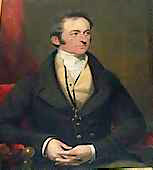George Heneage Lawrence Dundas
George Heneage Lawrence Dundas CB ( November 8, 1778 - October 7, 1834 ) was a Scottish rear admiral and politician .
Life
George Dundas was born on November 8, 1778, the eleventh child and fifth son of Thomas Dundas, 1st Baron Dundas and his wife Charlotte . His siblings include Lawrence Dundas, 1st Earl of Zetland , Charles Lawrence Dundas , William Lawrence Dundas, and Robert Lawrence Dundas . He was awarded the Order of the Bath with the rank of Companion . Dundas died on October 7, 1834.
Military background
Dundas joined the Royal Navy . In 1797 he had the rank of lieutenant . In 1800 he was promoted to commander and in 1801 to captain . After several years of service in the Mediterranean , Dundas returned to England in 1801 . In 1815 Dundas retired from active military service, but was reinstated as Rear Admiral in 1830 . In 1834, the year he died, he was appointed First Sea Lord . Dundas held this office until his death.
Political career
Dundas joined the Whigs . In the general election of 1802 Dundas ran in the constituency of Richmond (Yorks) , for which his brother Lawrence had previously held a mandate . In addition to his party colleague Arthur Shakespeare , Dundas was elected as one of two members of the constituency in the lower house. In the following elections in 1806 Dundas made his seat available in favor of his brother Charles Lawrence, who won the mandate and died in office. After his brother Lawrence held the constituency mandate through by-elections, Dundas was re-elected to the House of Commons for Richmond (Yorks) in the January 1812 elections. He did not run for the elections in October of the same year.
To represent family interests in the Orkney Islands , Dundas ran in the general election of 1818 in the constituency of Orkney and Shetland . He stood up against the incumbent Richard Honyman, 2nd Baronet and won the mandate with 19:12 votes. In the general election in 1820 Dundas did not run. Instead, John Balfour , who had represented the constituency as early as the 1790s, won the vote against Honyman. In 1825 Dundas announced that he would be available for the general election the following year. This triggered extensive tactical maneuvers to unite the various streams of interest on the island groups. Most recently, Dundas ran unopposed and moved into the House of Commons one more time. At the end of the electoral term he left parliament for good. He was succeeded in Orkney and Shetland by George Traill .
Individual evidence
- ↑ a b c d Information on George Dundas
- ↑ Rear-Adm. Hon. George Heneage Lawrence Dundas on thepeerage.com , accessed September 11, 2016.
- ↑ Information on the Richmond (Yorks) constituency
- ↑ Information on George Dundas
- ↑ Information on Orkney and Shetland constituency
| personal data | |
|---|---|
| SURNAME | Dundas, George Heneage Lawrence |
| BRIEF DESCRIPTION | British admiral and politician, Member of the House of Commons |
| DATE OF BIRTH | November 8, 1778 |
| DATE OF DEATH | October 7, 1834 |
